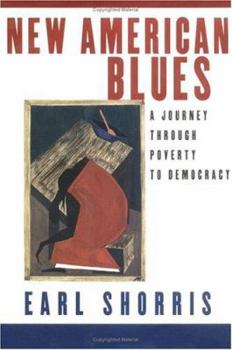New American Blues: A Journey Through Poverty to Democracy
A look at the daily lives of the poor in contemporary America analyzes their absence from, and apathy towards, politics and power, and suggests how they might rediscover their connection to the larger society and bring democracy to fruition.
Format:Hardcover
Language:English
ISBN:0393045544
ISBN13:9780393045543
Release Date:January 1997
Publisher:W. W. Norton & Company
Length:432 Pages
Weight:0.40 lbs.
Dimensions:1.4" x 6.4" x 9.5"
Customer Reviews
3 ratings
A Book that Will be Remembered
Published by Thriftbooks.com User , 25 years ago
If you care about the future of this country, read this book
This book is a must for all educators
Published by Thriftbooks.com User , 25 years ago
This book is about confronting poverty, about empowering the poor to take control of their lives, and is thus a major sociological document (though adoption of its agenda would put a small army of social fix-it people out of work). Just as important, though, it is a book about education, one that validates once again the irreplaceable treasure of a liberal education. The American educational establishment is in thrall to vocationalism, particularly, to preparation for corporate life (see "What Business Wants from Higher Education"). Aristotle warned us about this narrowly utilitarian view of mental culture, calling it the education of a slave. Taking to heart Robert Hutchins' aphorism ("The best education for the best is the best education for all"), Shorris took his idealism to the inner city and put a group of social cast-offs in touch with their powers--their intelligence, their sensitivity, their decency. Most went on to study successfully in college. We can't clone Mr. Shorris once, much less the thousands of times necessary to staff all the classrooms where someone like him is needed, but we can urge teachers and administrators to read his book. His book is a blessed antidote to the mountains of New Age educational tracts touting panaceas like cyber instruction, collaborative learning, education "tailored to the individual learning styles of each student," and other approaches that stress method at the expense of content.
Shorris hits soft underbelly of American equality myth
Published by Thriftbooks.com User , 26 years ago
Go ahead. Say it out loud: "Poverty," "Poor," "The Poor." Most of us feel at least uncomfortable if not repulsed when saying and thinking about these words. We push poverty away, deny its existence, avoid it and its implications. Not Earl Shorris. He plunges right in with his book "New American Blues," and takes us to places and through thoughts and situations that many of us would never choose to visit. Shorris, with insight like sharp knife, cuts to the quick and calls the question, what happens when people are acted upon? What happens when people are not at liberty to choose their response? Or on an even deeper level, what happens when people do not know that the liberty to choose their response is an option?Poverty in America, the blemish on the model's perfect skin, the scarred lip framing the endless smile, the Achilles heel of the "land of milk and honey," the ugly duckling shunted aside by the American myth, is what we meet as we travel with Shorris through America's underbelly. Shorris takes the bold step into "the surround" as he calls it, the enclosure, into the pen, into the hopeless, isolated entrapment of the poor in America and asks how this poverty came to be and why it persists. Perhaps a question worth asking in the wealthiest nation on the planet?Through his many examples of the dialogue of hopelessness and entrapment in the surround he brings the dark, perpetual stuckness of poverty in America into the light. For readers with the courage to look, it becomes crystal clear to just what extent the alienation and atomization of the citizens of the USA continue to drive a stake between the American ideals of equality, truth and justice for all -- and the cold bruising reality that is out there hiding (just barely) in the shadows.Shorris highlights the critical importance of supporting the individual in developing the ability to reflect, to develop the capability not simply to fall into the patterns of knee-jerk reaction, but to become conscious of the surround. Through interaction "in the polis," by becoming involved in our community, with the people around us, the outer dialogue can be changed and a new dialogue can be internalized. It is critical to note that for those whose lives are within the surround of poverty he posits no mind space between stimulus and response, no dialogue allowing for alternatives. Perhaps the experience of Viktor Frankl is illustrative in this regard. I quote from Stephen Covey: "One, day, naked and alone in a small room, he began to become aware of what he later called "the last of the human freedoms" -- the freedom his Nazi captors could not take away. They could control his entire environment, they could do what they wanted to his body, but Viktor Frankl himself was a self-aware being who could look as an observer at his very involvement. His basic identity was intact. He could decide within himself how all of this was going to affect him. Between what happene





